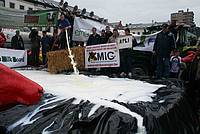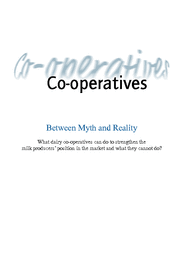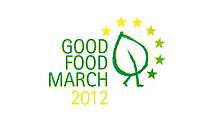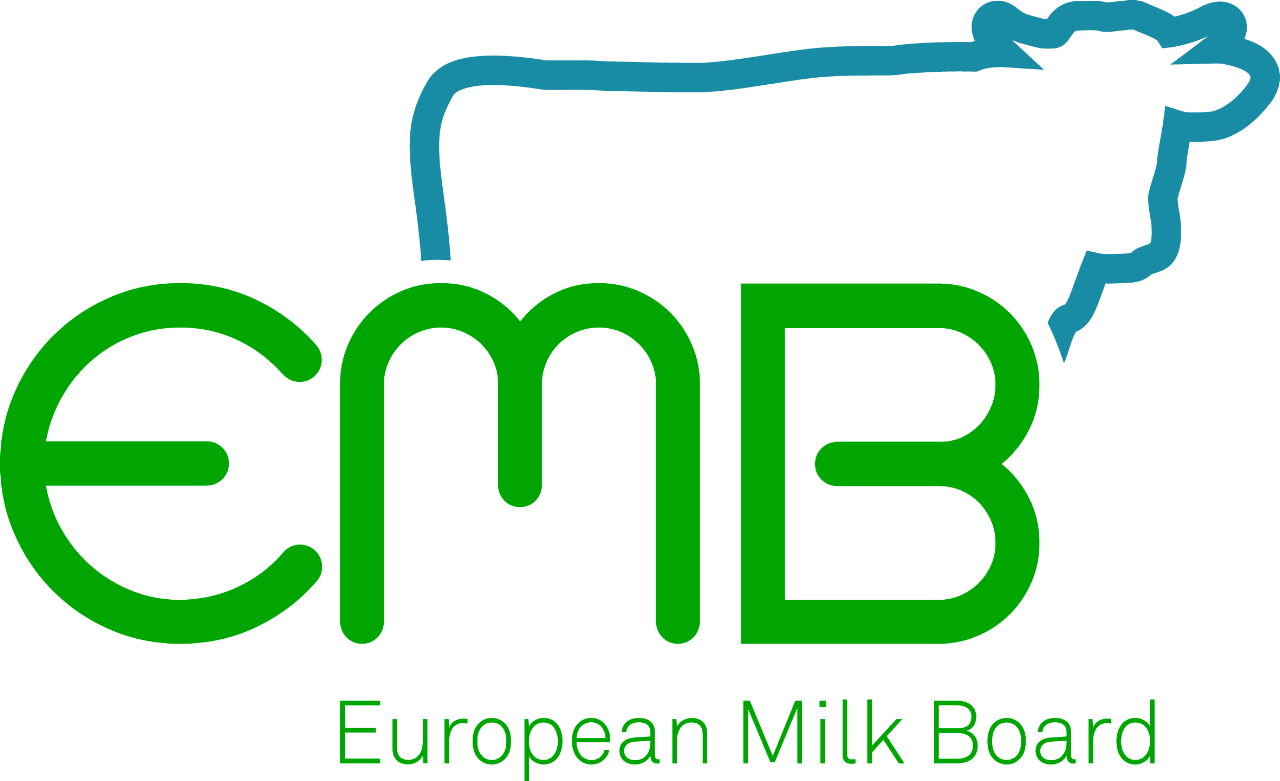EMB Newsletter August 2012
Newsletter as PDF
Contact
European Milk Board
Bahnhofstr. 31
D-59065 Hamm
Phone: 0049/2381/4360495
Fax: 0049/2381/4361153
E-Mail: office@europeanmilkboard.org
Website: http://www.europeanmilkboard.org
Newsletter as PDF
Contact
EMB - European Milk Board asbl
Rue de la Loi 155
B-1040 Bruxelles
Phone: +32 - 2808 - 1935
Fax: +32 - 2808 - 8265
Dear Dairy Farmers and Interested Parties,
To get straight to the point: we dairy farmers in Europe can be proud of ourselves. Proud of our village communities, proud of our family-run farms, proud of our work as farmers for modern-day society, and primarily of our product, milk. Once again with the demonstration outside the European Parliament in Brussels on 10 July we made it emphatically clear that we will defend our milk by hook or by crook. That is the only way forward now. Until the day our milk is valued again and nobody forces us any more to ditch our precious product out onto the street from milk lakes because of mindless overproduction.
The solutions are so simple. The EMB’s demands for a voluntary supply constraint and a European monitoring agency for the milk market must be adopted and put into practice. It is only the politicians in Brussels who now have to understand that and include it in the reform of the European agricultural market organisation in the next few months. Don’t worry: the EMB farmers will sort it out. In order to steer discussions and decisions in the European Parliament in the right direction in October/November, the EMB is determined to take even more severe and extensive actions. We count on your support.
Fortunately the dairy farmers are not alone and are supported by many other social groups. Together we champion an agricultural policy in Europe that both maintains the environment’s resources and secures the economic survival of milk producers on a family farming basis. That is why the EMB’s farmers are taking part in the Good Food March to Brussels in August and September 2012 – see the article on it in this issue of the EMB Newsletter. The aim of this cycle rally to Brussels is to take the demands from various European countries to the heart of the capital of Europe.
So I appeal to you all: come with us, support us and be there at the final demonstration of the Good Food March in Brussels on 19 September.
Erwin Schöpges (Member of the Board of the EMB)
Dairy farmers’ demonstration in Brussels a success
Hundreds of the European Milk Board’s dairy farmers demonstrated outside the European Parliament in Brussels on 10 July 2012. The reason for the demonstration was overproduction in the European dairy markets, resulting in a drastic collapse in milk prices and directly in the next milk and dairy crisis.
From the ranks of the European Milk Board (EMB), young and old had travelled to Brussels with rage in their bellies, supported by over thirty tractors, to protest loudly against the mismanagement in the milk market. To symbolise the current excess production in the European milk markets, they created a milk lake in the square outside the European Parliament and caused it to overflow. In other words: the surplus volumes in the market are producing rock-bottom prices. The survival of farms is at stake.
New brochure puts a few things straight about co-operatives
The European Milk Board (EMB) has produced a brochure that brings clarity to the issue of co-operatives in the dairy sector. It shows that the generally positive view the public still has of the co-operative form of organisation no longer reflects reality in many cases.
The worst imbalances and the specific situation in individual EU member states are described in three brochure articles by different authors. These reports are reproduced in abridged form in this and the next issue of the EMB Newsletter. If you are interested you can acquire the full version of the brochure on co-operatives in German, English and French from the EMB.
EU farming is in crisis. The CAP is being reformed. We must act now!
Back in May 2012, the European Milk Board came together with 7 other organisations to launch what is hoped will be the biggest civil society action ever seen on the reform of the Common Agricultural Policy (CAP): The Good Food March.
ARC2020, European Coordination Via Campesina, European Milk Board, Friends of the Earth Europe, IFOAM EU Group, Meine Landwirtschaft, PAC2013 and Slow Food issued a joint Call for Action which outlines 11 key demands on which they all agree. These demands include a CAP that delivers secure and stable cost-covering prices for farmers in general and fair prices for consumers; a CAP that does not leave behind real family farms; and a CAP that rejects food speculation and ends the export of agricultural products at a price below their production cost.
Great Britain‘s dairy farmers enjoy the full support of their colleagues throughout Europe
In the press release below, the European Milk Board states its full support for the protest of british milk producers against the slump of producer prices and the resulting milk strike:
Dairy farmers in Germany campaigning to retain the Market Structure Act
The aim of the Market Structure Act (MStG) in Germany is to improve the market position of farms. It enables producer collectives to be set up and permits what is termed “dual membership”, i.e. membership of a co-operative and of a producers’ union. It would not have been possible to set up the MEG Milch Board in Germany without the Market Structure Act.
Now the German Ministry of Agriculture wants to replace the Market Structure Act with the “Act governing the Recognition of Agricultural Organisations” (AgrarOG), supposedly because the EU Milk Package demands it. That’s not the way we see it! It is not at all necessary to amend the Market Structure Act in order to implement the Milk Package on a national basis. In those EU member states where there are no regulations, the Milk Package lays down the legal requirements for producers uniting and partly for the drafting of contracts.
EMB Calendar
Please find below some of the most important events in August 2012:
08.8.: Press conference of the EMB working group on milk pooling
25.8.: Start of the Good Food March in Munich, Germany
Full Texts
Dairy farmers’ demonstration in Brussels a success

Hundreds of the European Milk Board’s dairy farmers demonstrated outside the European Parliament in Brussels on 10 July 2012. The reason for the demonstration was overproduction in the European dairy markets, resulting in a drastic collapse in milk prices and directly in the next milk and dairy crisis.
From the ranks of the European Milk Board (EMB), young and old had travelled to Brussels with rage in their bellies, supported by over thirty tractors, to protest loudly against the mismanagement in the milk market. To symbolise the current excess production in the European milk markets, they created a milk lake in the square outside the European Parliament and caused it to overflow. In other words: the surplus volumes in the market are producing rock-bottom prices. The survival of farms is at stake.
Under the current reform of the European agricultural common market organisation, the concrete measures demanded by the EMB dairy farmers are a voluntary supply suspension and the setting up of a European monitoring agency to restore a balance between supply and demand in the milk markets.
At the end of the morning the demonstrators were agreed that the demo was a complete success. Yet again the direct action had shown how vital it is to stand shoulder to shoulder as European dairy farmers and represent the EMB’s positions in a credible manner. This impression was also underlined by the considerable resonance in the press, which the demo was accorded in European print media and on the TV. It drew the attention of the European public to the situation threatening the livelihood of dairy farmers in Europe.
The demonstrators announced that if the EMB’s demands are ignored by policy-makers in Brussels, they will return with a great deal more support from home. So the demonstration on 10 July was perhaps only a taster of an action-packed summer and autumn 2012. The ball is now in the politicians’ court – it is in their hands to put a stop to the milk crisis.
Christian Schnier (EMB)





